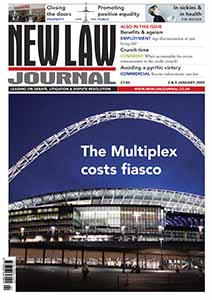
Janna Purdie considers the “substantial injustice” requirement for a successful challenge under s 68 of the Arbitration Act 1996.
Ian Smith contemplates some murky borderlines
How far should doctors go to inform patients about alternative procedures? Elizabeth Wale reports
Honours
Ulele Burnham examines how courts interpret positive equality obligations in public law
Musicians take note; Working time; Bar nursery
Sammut and others v Manzi Jnr and other (2008) ALL ER (D) 79 (Dec); Lord Phillips, Lord Hope, Lord Rodger, Baroness Hale and Lord Carswell, 4 December 2008
Taxation
Profession
James Lewis & Kit Jarvis discuss recent case law on enforcement
MOVERS & SHAKERS

NLJ Career Profile: Ken Fowlie, Stowe Family Law
Ken Fowlie, chairman of Stowe Family Law, reflects on more than 30 years in legal services after ‘falling into law’

Gardner Leader—Michelle Morgan & Catherine Morris
Regional law firm expands employment team with partner and senior associate hires

Freeths—Carly Harwood & Tom Newton
Nottinghamtrusts, estates and tax team welcomes two senior associates







